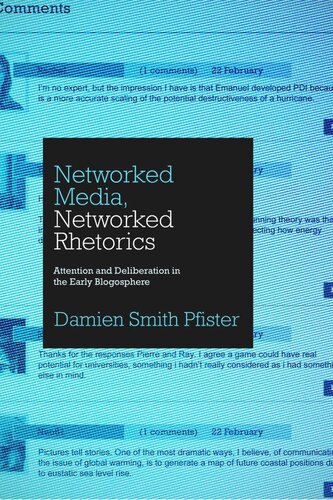

Most ebook files are in PDF format, so you can easily read them using various software such as Foxit Reader or directly on the Google Chrome browser.
Some ebook files are released by publishers in other formats such as .awz, .mobi, .epub, .fb2, etc. You may need to install specific software to read these formats on mobile/PC, such as Calibre.
Please read the tutorial at this link: https://ebookbell.com/faq
We offer FREE conversion to the popular formats you request; however, this may take some time. Therefore, right after payment, please email us, and we will try to provide the service as quickly as possible.
For some exceptional file formats or broken links (if any), please refrain from opening any disputes. Instead, email us first, and we will try to assist within a maximum of 6 hours.
EbookBell Team

0.0
0 reviewsIn Networked Media, Networked Rhetorics, Damien Pfister explores communicative practices in networked media environments, analyzing, in particular, how the blogosphere has changed the conduct and coverage of public debate. Pfister shows how the late modern imaginary was susceptible to “deliberation traps” related to invention, emotion, and expertise, and how bloggers have played a role in helping contemporary public deliberation evade these traps. Three case studies at the heart of Networked Media, Networked Rhetorics show how new intermediaries, including bloggers, generate publicity, solidarity, and translation in the networked public sphere. Bloggers “flooding the zone” in the wake of Trent Lott’s controversial toast to Strom Thurmond in 2002 demonstrated their ability to invent and circulate novel arguments; the pre-2003 invasion reports from the “Baghdad blogger” illustrated how solidarity is built through affective connections; and the science blog RealClimate continues to serve as a rapid-response site for the translation of expert claims for public audiences. Networked Media, Networked Rhetorics concludes with a bold outline for rhetorical studies after the internet.